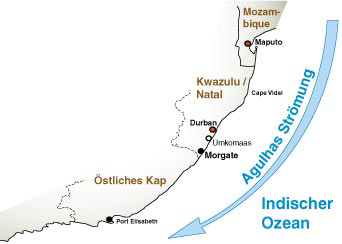
|
|
|
|
|
|
Shark Info (09-15-2000) |
Author |
|
Intro: |
Shark Info |
|
Main article: |
Whale Sharks: Central Theme of the AES Conference in La Paz, Mexico |
Shark Info |
Article 1: |
Shark Info |
|
Article 2: |
Dr. A. J. Godknecht |
|
Article 3: |
Dr. E. K. Ritter |
|
Fact Sheet: |
Dr. E. K. Ritter |
|
Is yet another South African marine ecosystem in danger?150 km west of Durban, between Margate and Shelley Beach, lies the approximately 1.6 km long reef Protea Banks, a well-known diving area for those interested in observing sandtiger sharks and various reef shark species. It is located only about 90 km south of the Aliwal Shoal Reef which we reported on in Shark Info 1/2000. Protea Banks now also appears to be out of control lately and risks being exploited and destroyed by a local fishing company. Dr. Erich Ritter, a member of our Shark Info team, was on the scene and now reports on the current situation. The SituationWithin the next few months, a fishing enterprise located in Margate is planning to export 14 tons of small-sized sharks destined for the food industry to Australia and New Zealand, provided they receive the relevant export license. Small animals are preferred because of the low amount of mercury stored in their bodies. The region to be fished is limited to Protea Banks, but such intensive fishing there would lead straight to the impoverishment of a very rich flora and fauna and finally to the destruction of one of South AfricaŚs two best known diving locations. The PartiesUpon inquiry by local diving firms, Paul Kolenda, the owner of the fishing company Inyoni, commented that he received the order to fish 14 tons of small sharks from his partner, Roger Holson. The company's present weekly catch is 400 kg, and according to Paul Kolenda, several 100 tons could be caught annually if the required on- site infrastructure is created. Initially the catch would amount to around 14 tons because this quantity represents the capacity of a normal freight container. Inyoni obtains its products from 25 different commercial fishing businesses along the South African coast.
To fulfill this large order, additional local fishermen would have to be signed on and these would earn approximately 6 Rand per kilo of sharks (about CHF 1.60). Prerequisite is, however, the receipt of an export licence to be granted by the Minister of the Department for Tourism, Trade and Industry, Dr. Valli Moosa. Local diving firms are trying to prevent the conferral of this permit for this would mean the end of their business and of the rich flora and fauna, not to mention the attraction of Protea Banks. USD 7,000 per headAs was already shown in the Bahamas, local diving firms point out that even in Protea Banks, a living shark brings more profit than a dead one. It was calculated that one single animal would bring tourist money of 50,000 Rand annually (approx. USD 7,000 or CHF 12,400), on the other hand, a dead animal depending on its size only about several hundred dollars. As a comparative figure, the value of a shark in the Bahamas is around USD 30,000 or CHF 53,000. Uncooperative local fishermenIn order that Inyoni can fulfill the required quota, local fishermen would have to be persuaded to concentrate their line fishing in the Protea Banks region. At the moment, however, they have no great interest in catching small sharks there because they earn only about 6 Rand per kilogram. On the other hand, they receive 13.50 Rand for pelagic sharks (large-sized animals), which is more than double per kilogram. Paul Kolenda from Inyoni is now trying to bring shark fishermen from the Durban area to Protea Banks. These fishermen are specialized in fishing small-sized species. Should Inyoni not be able to deliver the contingent "there are other fishing companies who can", says Roger Holson. It is presumed that Viking Fishing in the Cape region has already investigated the profitability of establishing a shark processing plant on the southern coast of Kwazulu-Natal. ConsequencesThe fishing of small-sized sharks poses significant ecological problems. Line fishing is nonselective and no predictions can be made as to which species of shark will be fished. Furthermore, fishing for small sharks is not limited to small species but will inadvertently include the offspring and the yet small-sized specimens of larger sharks. Eliminating the young animals in a population is especially dangerous because it will lead to a significant reduction of both sexually mature animals and population size. A good example of this mechanism is the collapse of spiny dogfish (Squalus acanthias) populations in the North Sea. Completely legalIn their attempt to fish sharks in Protea Banks, Inyoni is not embarking on illegal territory. Cedric Cötzee and Jeremy Cliff from the Natal Sharks Board in Durban confirm that none of the fished shark species are on the List of Endangered Species. ConclusionThe threat surrounding Protea Banks is only one of many fishing problems in South Africa. The Government has also granted foreign catch vessels the legal right to carry out longline fishing in its territorial waters, a project of enormous dimension which makes Protea Banks look like peanuts. Nevertheless, the maintenance of a local ecological system is at stake here, not to mention tourism in the entire region. We can only hope that Dr. Valli Moosa makes the right decision by not granting the export licence. * Dr. Erich K. Ritter is a shark biologist and adjunct assistant professor at Hofstra University, New York (USA) May be published only by indicating the source: Shark Info / Dr. E. K. Ritter |
|
|
|
|
|
|||||
